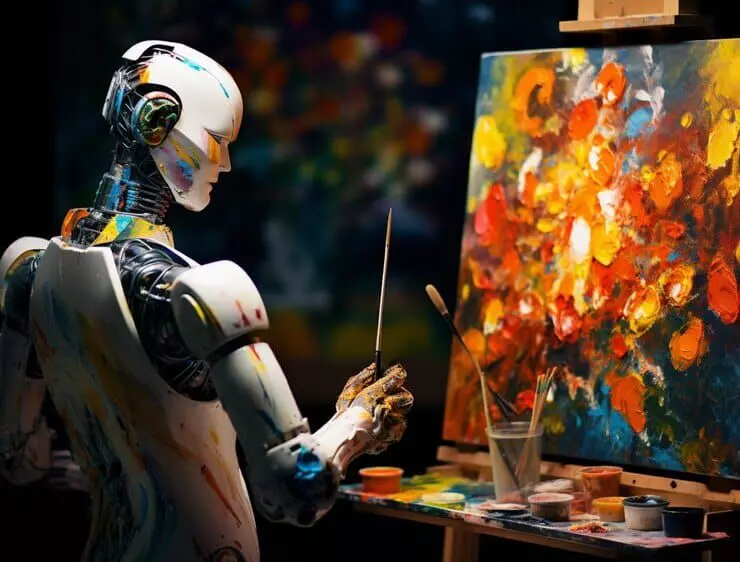Is AI a threat to creativity?
The AI Renaissance: Creativity’s New Frontier?

When National Award-winning filmmaker Srijit Mukherji started working on his Bengali film ‘Oti Uttam’ six years ago, Artificial Intelligence (AI) was an alien concept. Today, Srijit has used AI and VFX to recreate the magic of Uttam Kumar on the big screen. Even in his next Bengali film,’Padatik’, a tribute to the legendary director Mrinal Sen, Srijit has used AI to dub Satyajit Ray’s voice.
Whenever there has been advancement in technology, creativity has always been seen as a uniquely human skill that's vital for the future. But now, with AI like ChatGPT, DALL-E 2 and Midjourney, things are changing rapidly. In fact, the advent of Sora, a revolutionary text-to-video model, which can generate high-quality videos from text prompts, raises questions on the democratization of filmmaking. That AI is a threat for the creative industry was proved last year when Hollywood screenwriters had a 148-day strike against the use of AI. Later, a deal was struck with studios, imposing restrictions on the utilisation of AI for replicating performances. Famous Bollywood screenwriter and lyricist Javed Akhtar believes AI “can’t be as creative as a human being, because human beings don’t think in binary.”
Srijit holds the belief that AI poses a significant threat to numerous industries, including the creative sector. But he is also confident that human skills and creativity will continue to rule. “When computers were introduced, we thought it would be a job threat. Then, we learnt that technology and made ourselves accustomed to it. So, we need to learn and adapt to AI. And if you can’t be as creative as AI, then you won’t survive in the race,” said the ‘Begum Jaan’ filmmaker.
When ‘Indiana Jones and the Dial of Destiny’ released in 2023, audiences were surprised to see Harrison Ford (80) being digitally rejuvenated using AI technology. In fact, the same was said about Shah Rukh Khan in Rajkumar Hirani’s 'Dunki’. In an article in 'The Guardian', German-born visual effects supervisor based in LA, Olcun Tan, was quoted saying, “We’re going through a big revolution. This is like the invention of nuclear power. This is a big deal. It’s underestimated and overlooked. Currently, it feels like, ‘Oh, it’s a toy, it’s awesome, look what it can do,’ but this is just the start of a big change in our economic structure because it will do a lot more than normal humans can do.” According to Harvard Business Review, “AI will support humans to do the work they already perform, but simply allow them to do it with greater speed and efficiency”.
In fact, AI is revolutionising the art world, not only by generating images and paintings but also by assisting artists in discovering new avenues for self-expression. Nien Siao, Dean, JS Institute of Design, doesn’t mince words when she said that AI will become an indispensable part of the creative process. “It will automate tedious tasks like sketching or optimization, freeing artists and designers to focus on the big picture and truly unique aspects of their work. AI won't dictate the art; it'll help you find new inspiration, try variations lightning fast, and explore possibilities that once took days of manual labour,” she said.
In fact, she wants every professional in the field of art, design and game designing to think of AI as the “ultimate design brainstorming partner.” "With AI, you can generate variations of your work, test ideas quickly, and even create personalised experiences for players based on how they interact with your games. AI helps you understand player behaviour and will push you to break boundaries, like creating changing landscapes or stories that branch out based on players' choices,” she said.
Siao also mentioned that AI might generate images or ideas, but it's up to humans to inject emotion, personal vision, and the nuances that will make the work stand out. “AI is another tool at your disposal, and like a new kind of brush or material, how you use it will create something truly innovative,” she said.
In October 2023, two young musicians grabbed headlines with a special video on how Mohammed Rafi would have sung Salim Suleiman's 2008 hit 'Haule Haule Hojaege Pyar'. The AI-version of the song went viral. On Wednesday, more than 200 musical artists — including Billie Eilish, Katy Perry, Jonas Brothers and Smokey Robinson — wrote an open letter to AI developers, tech firms, and digital platforms to "cease the use of AI to infringe upon and devalue the rights of human artists." Agreed, AI's influence on the creative industries of painting, filmmaking, and music is indeed multifaceted. While it presents new opportunities for innovation and efficiency, it also brings to the forefront crucial ethical, legal, and artistic considerations that must be carefully navigated.
“Different ethical considerations, notably in terms of intellectual property and authenticity, arise from the use of artificial intelligence in creative fields. The question of who owns the rights to AI created works and how to protect the originality of human creators is becoming more and more common as the number of AI generated content increases. As AI systems generate content autonomously, attribution and proper credit have become blurred. In addition, there is a risk that artificial intelligence will be used to replicate existing works without permission or to create false content that resembles human art,” said Heta Desai Baandal, Managing Director, Sociomark.
As AI-driven tools will continue to democratise the creative process by making it more accessible to individuals with diverse skill sets and backgrounds, potentially leading to a more inclusive and diverse creative landscape, it is also important to protect creativity and stand for artistic freedom. It's imperative to confront the ethical dilemmas through robust legal structures, transparent attribution methods, and ongoing discourse among creators, AI developers, and policymakers.




